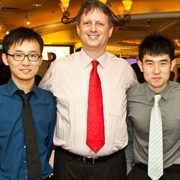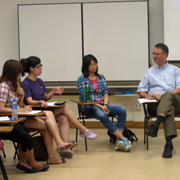
Next-door to the Samriddhi (The Prosperity Foundation) building in Kathmandu is a hammer-and-sickle flag above the headquarters of one of Nepal’s several Communist parties. “If you needed a more immediate reminder about why this is important,” said Professor Andrew Morriss, “you couldn’t do better than that.” Morriss teaches at the University of Alabama School of Law and teaches a weeklong economics course for TFAS students in Hong Kong as part of The Fund for American Studies’ Asia Institute for Political Economy (AIPE). This summer, after Hong Kong, he will make his second trip to visit TFAS alumni at Samriddhi, a rare free-market think tank operating in Nepal.
The first trip to Nepal took place last year. A steady group of excellent students had been coming to AIPE from Nepal each year; most of these had found TFAS through Samriddhi. So last summer, after his Hong Kong course, TFAS sent Morriss there to check it out.
“I was really impressed with the quality of the program that Samriddhi is putting on and with the quality of the participants that they had managed to recruit,” said Morriss, who spent time at several of the programs Samriddhi runs. During the trip Morriss also spoke one-on-one and in panel discussions about economic reform with the press and politicians from many of the major political parties. He also led a workshop with students on market solutions to environmental problems. According to Morriss, the students were very eager to learn, and remarkably, the politicians were as well. A significant feat of Samriddhi is that it brings together business leaders and politicians – including those from the majority Maoist Party – for genuine discussions of the issues, and this in an environment where political imprisonment – or even assassination – is a real possibility. “They are pushing on every margin and advancing the cause of liberty at significant personal cost,” said Morriss. “I think that it’s incredibly inspiring to be around people like that.”

Samriddhi emerged amidst a 2006 movement in Nepal to end the monarchy and open up space for political freedom. The founders, including TFAS alumnus Arpita Nepal (HK 07), saw a need for more discussion on economic issues. At the time, Ms. Nepal was also seeking a program that would allow her to study these economic issues in greater depth. She decided to attend AIPE in Hong Kong, where she met Morriss. Since then Samriddhi has sent several students to AIPE each year.
Morriss’ class in Hong Kong gives AIPE students from Nepal and across Asia a solid foundation in the ideas of economic freedom. In his class students gain the tools to become leaders, to start organizations like Samriddhi, and to spread the ideas of liberty back in their home countries. “My experience has been that students in Asia welcome the opportunity to get new ideas that they’re not hearing at home because they’re looking for tools to help their societies become better,” said Morriss.
AIPE has several advantages when it comes to spreading these ideas – the importance of entrepreneurship, for example, and property rights – and in motivating students to use them to make a difference. First, TFAS has faculty who are genuinely passionate about what they teach and are eager to do more. In addition to Hong Kong and Nepal, Morriss has done similar work for TFAS in China and Cambodia. Also, for the students, the concepts covered at the institute often have an urgency that would be hard to match in the United States. “The way many of these people have come to these ideas is direct experience. It’s not theoretical for them; it’s their daily life,” said Morriss. Students coming from Nepal have likely lived through civil war, and political violence continues even today; the dominant party in their government calls themselves “Maoists”; and the country, despite its potential for trade, is still largely impoverished. There is, therefore, a clear and immediate need for new ideas in politics and the economy.
Finally, AIPE has the advantage of location. Hong Kong is a living demonstration of a dynamic and prosperous market economy at work. Morriss makes full use of this backdrop in his Hong Kong course. To complement classes on subjects such as spontaneous order, competition or property rights, Morriss sends his students into the city to experience the free market firsthand. They haggle over goods in Hong Kong’s Night Market, visit with business leaders, and examine competition and business practices at places like the dried seafood market.
According to Morriss, students take away several key points from these exercises. They witness economics in action, going beyond the course readings. But also, they see the power of freedom, what it can achieve, and the potential for their own countries – whether it is Cambodia, Laos, Nepal, India or any of the various countries AIPE students call home. “Take a look at Hong Kong and you say, ‘Wow this place really had nothing.’ And look at what’s here now – all of that has just come from people participating in a free economy.”
The impact is not isolated in just Nepal or Cambodia or India – the implications of economic freedom are global. As Morriss notes, Americans are safer and better off the more widely spread these ideas are.
This is a battle of ideas that has been going on for two hundred-plus years between people who think they can remake humanity and people who believe in a society of free and responsible individuals. And there is no wall separating us from the rest of the world,” said Morriss.
Through the generous support of the Weil family and TFAS donors, students like Ms. Nepal are able to attend AIPE and develop the skills to become the leaders of liberty in their own countries. This support has also given Morriss the chance to take that message directly to the Nepalese students that could not make it to Hong Kong. Morriss says he sees enormous potential in a partnership between TFAS and local organizations like Samriddhi, where the local knowledge these organizations bring to the table, combined with the TFAS’ resources – books, active alumni, professors and supporters – creates a cost effective way to not only reach more students, but also to spread the ideas of liberty to areas that could not be reached before. “We found the core of local champions through AIPE and through Samriddhi – the people who want to go out there and be missionaries for the gospel of freedom,” said Morriss. “That’s what Nepal needs, and that’s what Asia needs. They need ideas.”

